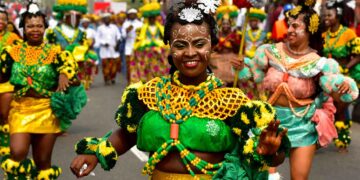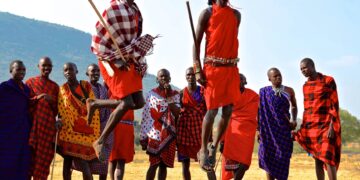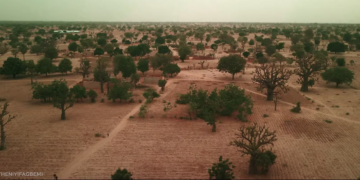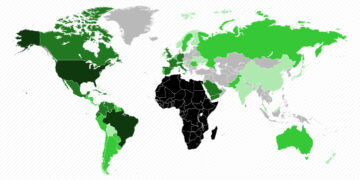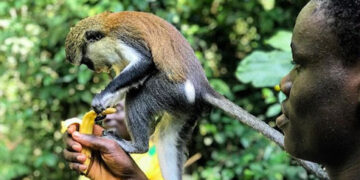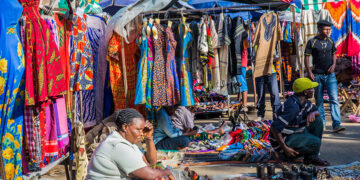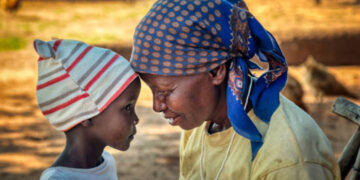In this article we delve into the rich tapestry of African wedding traditions, revealing the beautiful diversity and profound cultural significance they hold.
When you hear there’s an African wedding, you will be correct to picture beating drums, vibrant attires of every hue on the continent, rhythmic body movements ranging from high energy gyrations to calm shuffles of the feet. Music, dance, food, pomp and pride, will be on full display.
African wedding rituals and ceremonies are part of our cultural heritage, and across the different countries and tribes, you will find some common practices in African cultural wedding traditions.

‘Knock on the door’ – Pre-wedding tradition
“Knock, knock, who’s there?” ‘Knock on the door’ is an African pre-wedding tradition, which signifies that the families of the bride and groom have given their approval for the wedding.
In Eastern Nigeria, ‘Knock on the door,’ is a part of the Igbo tradition, and is called, ‘Iku aka.’ The groom, accompanied by his family, brings gifts and comes to meet the bride-to-be’s family to request permission to ‘pluck a flower’ (take the bride from her family). Sometimes, he may undergo “testing” to confirm if he is really sure of his choice and if the bride is willing to accept him.
In Ghana, it is known as ‘Kookoo ko,’ and is taken quite literally. The groom knocks on the door of his prospective in-laws’ home, and if the bride-to-be answers three times, he and his family are allowed into the home, and the wedding planning can begin.


In the case of arranged marriages, it may be a member of the groom’s family, like his father, who will go to meet the bride-to-be’s family to seek permission for the two to be married. In other cultures, the village head, or local chief as well as the community members have to all agree before the marriage can take place.
Tying of The Knot
Tying the knot is the symbolic tying of the hands of the bride and groom with a piece of cloth, rope cord, a string of cowrie shells, leather, or braided grass to signify their union and commitment to each other. In Ethiopia, it’s the garments of the groom and bride that are tied together, and symbolizes their coming together to be bound in marriage forever. I wonder how tight the knots must be tied though?
In Somalia, the practice of tying the knot comes with other cultural and religious rituals, such as the Nikkah. In Ghana, the bind is made from Kente cloth or cowries shells and represents fertility and prosperity. In some cultures, the couples say their vows before or after the knot is tied.
Henna Ceremony
It can be quite an emotional episode for a girl to leave her father’s house. So it’s not surprising that an African bride receives a lot of special treatment on the days that lead up to her big day. In some African communities, it’s common for the bride and her female friends to hold what is called a ‘henna ceremony/party’ (Is that where the West got their “Hen night” from?) in the days leading up to the wedding. The bride is pampered and not allowed to do any work.

Henna is applied to various parts of her body such as the hands, legs and feet; and in some instances the groom as well. There’s dancing, singing, and prayers for the bride-to-be and because this is the last time she will be with her family as an unmarried woman, the older members of the family offer her advice and encouragement.

Photo Credit: Arts Universtity
The ceremony can take from two days to a week in Somalia, or it can happen the night before the wedding, depending on the region. In Egypt, their henna ceremony is called ‘Laylat-al-henna’, held on the night before the wedding. The bride, her sisters, cousins, and close friends are invited to participate in this ceremony.
Kola Nut Offerings and Libations
In West Africa, the kola nut is a popular fruit that is packed with caffeine and used for medicinal purposes. It also symbolizes respect, hospitality, healing and unity. It is traditionally offered to guests to signify that they are welcome and accepted in the home.
In African wedding ceremonies, it’s traditional for the ‘breaking the kola nut’ ceremony to occur when the groom arrives with his family as a way to welcome them in good faith. In Gambia, the groom sends kola nuts to the bride’s family. If they are received, a representative of the groom meets with the bride’s family to set a date for ‘breaking the kola’ (marriage).
Libations are made to the gods and ancestors to show reverence, and to seek their blessings for the couple’s union.
The Engagement Ceremony – Bride Price and Exchange of Rings
In some communities the engagement ceremony is where the bride price is paid. Bride price in African communities is the price the groom has to pay to the bride’s family to compensate the family for training the bride from childhood to maturity. In some cultures it signifies the groom buying the bride from her family (thus treating her as a commodity or piece of property), or it could also be a way to show the bride’s family that he can take care of her.
In Kenya, the Agikuyu community calls the engagement ceremony ‘Ruracio’, and in South Africa, the Zulus call it ‘Lobola.’ The bride price payment is discussed between both families until an agreement is reached (in some communities the amount is symbolic). Sometimes the parents of the bride return the bride price to the groom.



In the Yoruba tradition in Nigeria, the engagement ceremony is called Igbeyawo. It happens a day before the religious marriage ceremony or on the same day. The complete ceremony is coordinated by two delegates selected or appointed from each family. The role of the groom’s family is managed by the Alaga Iduro or Olopa Iduro (standing police officer), while the bride’s family is overseen by the Alaga Ijoko or Olopa Ijoko (sitting police officer). The groom’s family presents the bride with the bride price, which could include foodstuffs, cash, and household items.
Matching Outfits for The Wedding Party

African wedding ceremonies can wind up looking like the local MET Gala. And to top it all, most of the wedding party will wear matching outfits popularly referred to as Aso-Ebi, especially in western African ceremonies. The term ‘Aso-Ebi is a word in the Yoruba language, which means family cloth.
There is always an array of colors as people flaunt the latest fashion styles and trends. Usually, the bride will choose the general color theme she wishes for her wedding, then the women of the family get to pick the particular fabric or cloth that will be worn by the wedding party.
Wearing the Aso-Ebi is often regarded as a symbol of unity between the family members of the bride and groom. Other guests who do not get the Aso-Ebi usually try to wear something similar to show solidarity.

Photo credit: Bridesmaids Africa
Feasting and Drinking
Where there is a social event, trust that Africans will do their best when it comes to the food. This is one of the reasons why African traditional weddings can be very expensive, because the family of the couple will feed their guests and feed them well. It is a thing of pride to have well-fed wedding guests.
Music, Dancing and “Spraying of Money”
What’s an African wedding without music, dancing and spraying money? When the music plays, expect people to dance.

It’s popular in West African weddings to “spray money” on the bride and groom whenever they dance. This is to show appreciation to the couple, and if you didn’t get them a wedding gift, you can go ahead and shower them with some currency notes. “Spraying of money” is also a show of wealth and affluence and symbolizes that the future of the bride and groom will be prosperous.
REFERENCES
Face 2 Face Africa: Omenana: Breaking of the Kola Nut
Jo Sa Bi Mariees: Discover The Most Intriguing African Wedding Traditions
Naija Glam Wedding: Overview of Groom’s Customary First Visits to Meet His Igbo In-Laws
Sikaa – African Wedding Traditions: How We Do It?
The Knot – Unique Ghanaian Wedding Traditions & Rituals, Explained
Wedding Feferity – Yoruba Traditional Wedding Ceremony – Igbeyawo
Yeah Weddings – 10 Common African Wedding Traditions & Customs
Yen – Knocking ceremony in Ghana explained: Everything you should know



